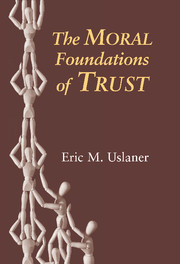Book contents
- Frontmatter
- Contents
- Preface
- 1 Trust and the Good Life
- 2 Strategic Trust and Moralistic Trust
- 3 Counting (on) Trust
- 4 The Roots of Trust
- 5 Trust and Experience
- 6 Stability and Change in Trust
- 7 Trust and Consequences
- 8 Trust and the Democratic Temperament
- Epilogue: Trust and the Civic Community
- Appendix A
- Appendix B
- Appendix C
- References
- Author Index
- Subject Index
8 - Trust and the Democratic Temperament
Published online by Cambridge University Press: 12 January 2010
- Frontmatter
- Contents
- Preface
- 1 Trust and the Good Life
- 2 Strategic Trust and Moralistic Trust
- 3 Counting (on) Trust
- 4 The Roots of Trust
- 5 Trust and Experience
- 6 Stability and Change in Trust
- 7 Trust and Consequences
- 8 Trust and the Democratic Temperament
- Epilogue: Trust and the Civic Community
- Appendix A
- Appendix B
- Appendix C
- References
- Author Index
- Subject Index
Summary
It's difficult to have a civil society when the country is corrupt and criminalized. … When society is under stress, it's not a good time to talk about civil society. You need stability. … Now, we are just surviving. We don't have enough energy, time, and money for this. It's hard times, like during the war, and you have to survive on your own.
– Russian pollster Masha Volkenstein, as quoted in Hoffman (1996, A40)Some years ago the noted novelist E. M. Forster (1965, 70) gave “Two Cheers for Democracy,”
one because it admits variety and two because it permits criticism. Two cheers are quite enough: there is no occasion to give three. Only Love the Beloved Republic deserves that.
Perhaps there is a reason for a third cheer. Democratic societies are trusting societies.
The big payoff from interpersonal trust, most contemporary observers say, is that it leads to “better” government and to a public that is happier with government performance. Or maybe good government makes people more likely to trust each other. Or perhaps both.
Here I seek to examine, in a broader, cross-national context, the causes and consequences of trust. More specifically, I shall show that the same arguments made about the effects of trust in American society and its polity apply more generally across nations. A host of factors have been cited as potential determinants of trust, including education levels, media usage, a strong legal system, corruption, and the foundation of a civil society – membership in voluntary organizations.
- Type
- Chapter
- Information
- The Moral Foundations of Trust , pp. 217 - 248Publisher: Cambridge University PressPrint publication year: 2002



